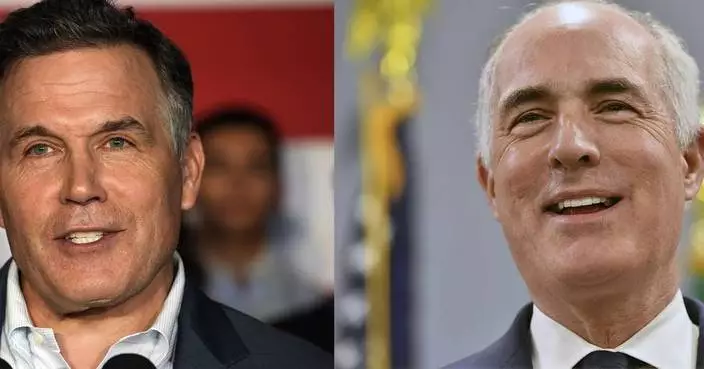In some ways, President Donald Trump has brought Tammy Kennedy and her daughter, Sue Ann, together on politics.

President Donald Trump holds up an executive order for border security and immigration enforcement improvements after signing the order during a visit to the Homeland Security Department headquarters in Washington, Wednesday, Jan. 25, 2017. (AP Photo/Pablo Martinez Monsivais)
They don't agree on every issue— Tammy supports abortion rights, for example, while Sue Ann opposes them. Even so, the two agree on most issues and disapprove of the way Trump is doing his job.
"I think we've talked about him in terms of immigration," said Tammy, 51, of Trump's crackdown on illegal immigration that has resulted in the separation of some parents and children at the borders. "I can't imagine my child being ripped away from me."
"We do agree on his performance," Sue Ann, 18, said.
They're part of a majority of American young people and their parents who disapprove of the job the president is doing, a poll shows. The survey conducted by The Associated Press-NORC Center for Public Affairs Research and MTV found that 57 percent of parents and 73 percent of young people ages 15 to 26 disapprove of the president's performance.
The common ground doesn't end there. The generations also agree that politics have become dysfunctional, and both say they're dissatisfied with the two-party system.
On issues broadly, a 55 percent majority of young people and their parents say they usually see eye to eye, and 31 percent say they debate things diplomatically. Just 9 percent say they avoid talking politics, and only 5 percent say their debates turn into "World War III."
And most say they agree with each other on a wide variety of individual issues, including feelings on the economy, health care, immigration, racism and abortion.
Still, hotheadedness abounds over politics, as anyone who has access to the internet knows. The survey showed that online, especially, politics seeps into interactions with extended family members. Twenty percent of young people and their parents say they have done the virtual equivalent of uninviting a family member — by blocking them or unfriending them — because of a disagreement over politics. An equal percentage of both generations say they have been blocked or unfriended.
Mackenzi Curtis, 22, said she stopped following one older family member, who's in his 60s, on Facebook over his posts about the students of Marjory Stoneman Douglas High School in Parkland, Florida. Several students became gun control advocates after a gunman killed 17 people on Feb. 14.
"I was thinking they're pretty much bullying a teenager that's been through a traumatic experience," Curtis, a mother of two in Cedar Rapids, Iowa, said. "I think it has a lot to do with the difference in generations."
Eleven percent of respondents say they have had a holiday gathering ruined over politics, while about an equal percentage say they've decided not to attend a family event for the same reason. Seventeen percent say political disagreements inspired a relative to skip a family event.
The two generations are equally likely to engage on social media on the Nov. 6 elections, the study found. A quarter of parents and young people say they'll post or comment on the midterms, and similar percentages say they share memes about the races. That's a key data point for the campaigns trying to rev up and drive voters to the polls.
By any measure, Trump revolutionized Twitter as a political instrument before his 2016 upset over Democrat Hillary Clinton and during his presidency. Ahead of the 2018 midterms, both parties are leveraging the power of social media, engagement and relationships as Republicans defend their congressional majorities and Democrats try to topple them.
Among parents and young people who say they aren't of the same mind, young people say they tend to disagree with their parents most about racism, while their parents say the largest area of disagreement is gun control. Both generations tend to point to Trump and LGBT rights as sources of contention.
The generations say it can be hard to sway the other generation when differences exist, but not necessarily impossible.
Few young people and parents — only 11 percent overall — say they are always able to persuade each other to change his or her views, but another 53 percent say they can sometimes do it. Just 6 percent say they can always be persuaded, but 44 percent say they sometimes can be.
Larry Kapenstein, a 64-year-old retired postal worker in Middletown, Pennsylvania, said Trump most recently displeased his family by disinviting the Philadelphia Eagles — this year's Super Bowl champions — to the White House. But while they agree on Trump, Kapenstein said one of his children can be hard to convince on taxes. He's coming to terms with where chunks of his paycheck go. And that can lead to the question of who's to blame for that.
Hint: Voters and the politicians they elect.
"He just doesn't understand why we have to pay taxes," Kapenstein said. "He's just getting into the working world, but he just doesn't get it."
VILLA MADERO, Mexico (AP) — As a drought in Mexico drags on, angry subsistence farmers have begun taking direct action on thirsty avocado orchards and berry fields of commercial farms that are drying up streams in the mountains west of Mexico City.
Rivers and even whole lakes are disappearing in the once green and lush state of Michoacan, as the drought combines with a surge in the use of water for the country’s lucrative export crops, led by avocados.
In recent days, subsistence farmers and activists from the Michoacan town of Villa Madero organized teams to go into the mountains and rip out illegal water pumps and breach unlicensed irrigation holding ponds.
A potential conflict looms with avocado growers — who are often sponsored by, or pay protection money to, drug cartels.
Last week, dozens of residents, farmworkers and small-scale farmers from Villa Madero hiked up into the hills to tear out irrigation equipment using mountain springs to water avocado orchards carved out of the pine-covered hills.
The week before, another group went up with picks and shovels and breached the walls of an illegal containment pond that sucked up water from a spring that had supplied local residents for hundreds of years.
“In the last 10 years, the streams, the springs, the rivers have been drying up and the water has been captured, mainly to be used for avocados and berries,” said local activist Julio Santoyo, one of the organizers of the effort. “There are hamlets in the lower part of the township that no longer have water.”
Santoyo estimated that about 850 of the plastic-lined, earthen containment ponds have sprung up in the hills around Villa Madero, usually soon after planters have illegally logged or burned the native pine forest. Pines help the soil retain water, while avocado trees deplete it.
Francisco Gómez Cortés said residents of his hamlet, El Sauz, had been asking the landowner for 15 years to allow the spring to flow downhill to their community.
After a year in which Mexico received only about half its normal rainfall, residents became desperate, and last week they worked up the courage to hike up the hill and rip out pumps and hoses for the avocado orchard.
“We don't have enough water for human consumption,” Gómez Cortés said.
“It’s sad. It’s sad to walk down these trails that are now dry, when they once had trees and springs,” he said. “They haven’t even left any water for the (forest) animals that nest along the banks.”
In a sign of how seriously the local government is taking the potential threat, the group was accompanied by the mayor of Villa Madero, who blamed outsiders for the problem.
“There are people who aren't from this town, who come to our township and are invading us,” Mayor Froylan Alcauter Ibarra said. “They are taking water away from the people who live downhill, and they don't realize these are the poorest people.”
Residents say they don't want to deny water entirely to the orchards and have proposed an agreement to give landowners 20% of the water from local streams, if they allow the remaining 80% to keep flowing. They say they haven't gotten any response yet.
Drug cartels often make money from illegal logging and extorting money from avocado growers in Michoacan. The activists around Villa Madero have suffered threats, kidnappings and beatings in the past.
“We are running a serious risk of them killing us for protesting,” Gómez Cortés said. “Out of necessity, we are doing what the government should be doing.”
The government has long done little to limit the growers and combat deforestation and water takeovers. But it does seem to have developed a sudden interest in preventing the looming conflict.
In March, activists organized a meeting nearby at Patzcuaro Lake to demand authorities do something about the fast-declining water levels. Patzcuaro is a shallow but extensive lake in Michoacan with a beautiful colonial town on its shores and an island of fishermen perched in the middle.
The fishermen of Janitzio island with their shallow boats and hooped, figure-eight nets were made famous by photographers and filmmakers in the 1940s and 50s as a symbol of Mexico's folk traditions. The town of Patzcuaro draws hundreds of thousands of tourists.
But due to the drought, deforestation, sediment buildup and the increased water demands from avocado and berry growers, Patzcuaro lake has been reduced to about half its size. You can now reach the Janitzio island by wading, and activist Juan Manuel Valenzuela estimates that 90% of the boats that used to fish and ferry tourists around are now out of service.
Nearby Lake Cuitzeo, one of the largest freshwater lakes in Mexico, is now nearly dried up.
“We cannot allow them to extinguish our lakes,” Valenzuela said. “It would be a tragedy for Michoacan.”
Alejandro Méndez, Michoacan's state environment secretary, acknowledges that the problem has gotten out of hand. So scarce has water become in the once-lushly forested lake areas that orchard owners often send tanker trucks to suck thousands of gallons from the lake to water their groves.
“As many as 100 trucks could be seen taking water from the lake,” Méndez said of the situation in March.
So about a week ago, the state police began patrolling the lake shore and detaining any truck drivers they saw extracting water. And Méndez said the state has begun monitoring agricultural holding ponds to see if any are getting refilled from the lake.
While Lake Patzcuaro has grown and shrunk in the past, this time it may be terminal; farmers are starting to pasture livestock and plant crops on the lake bed.
“It will be difficult, because the humans and the livestock will survive, barely, but the animals and the plants will be gone — that will all be dried up and gone,” Gómez Cortés said.
AP writer Mark Stevenson in Mexico City contributed to this report.
Follow AP’s coverage of Latin America and the Caribbean at https://apnews.com/hub/latin-america
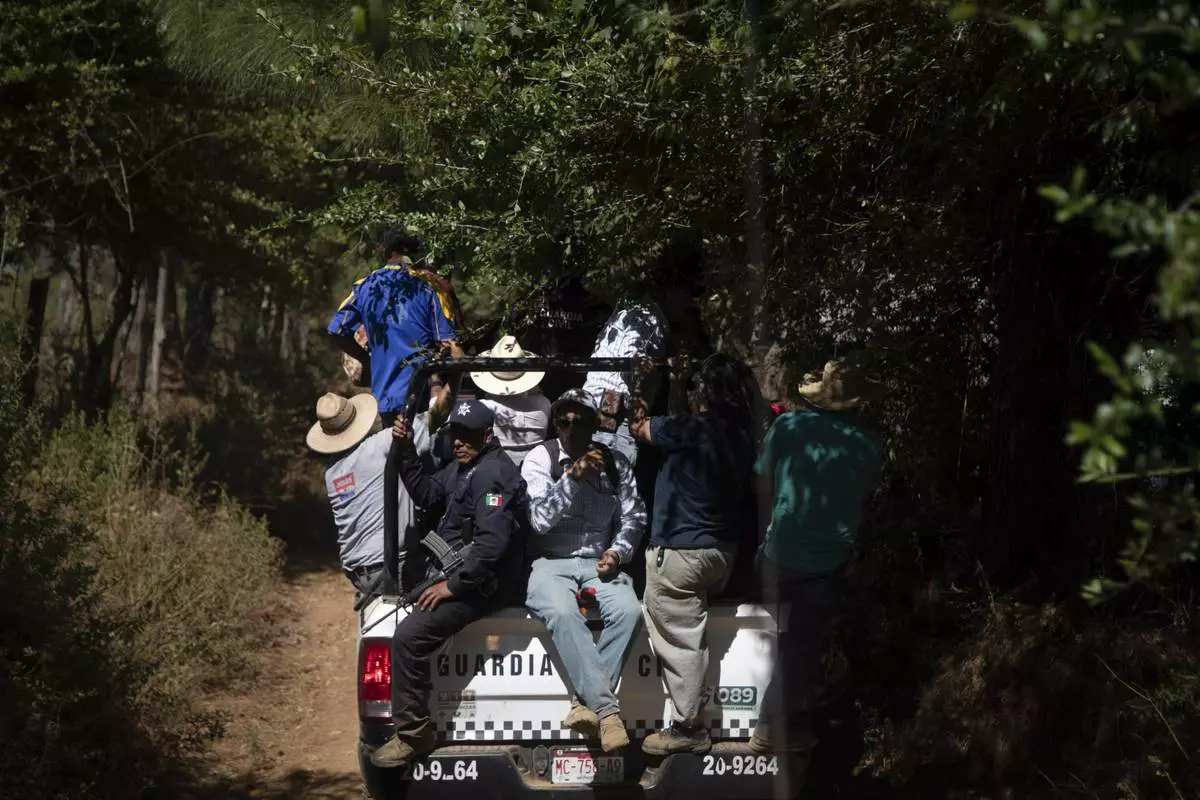
Locals ride in a National Guard truck in search of unlicensed water intakes and irrigation holding ponds that irrigate avocado and berry orchards during a drought in the mountains of Villa Madero, Mexico, Wednesday, April 17, 2024. Subsistence farmers and activists from the Michoacan town of Villa Madero organized teams to go into the mountains and rip out illegal water pumps and breach unlicensed irrigation holding ponds. (AP Photo/Armando Solis)
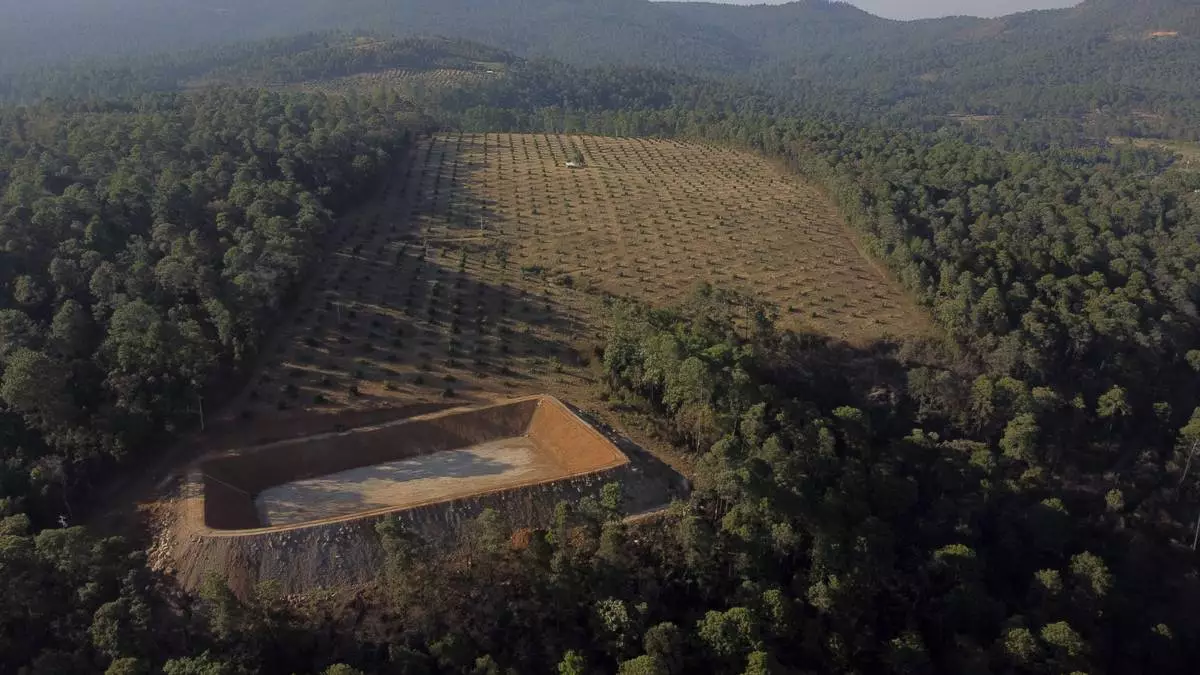
An unlicensed irrigation pond is under construction by an avocado orchard during a drought in the mountains of Villa Madero, Mexico, Wednesday, April 17, 2024. Farmers from Villa Madero who spotted the pond say they plan to meet with authorities to get the pond's owner to agree on a percentage of water usage, and if it fails, they plan to destroy it. (AP Photo/Armando Solis)
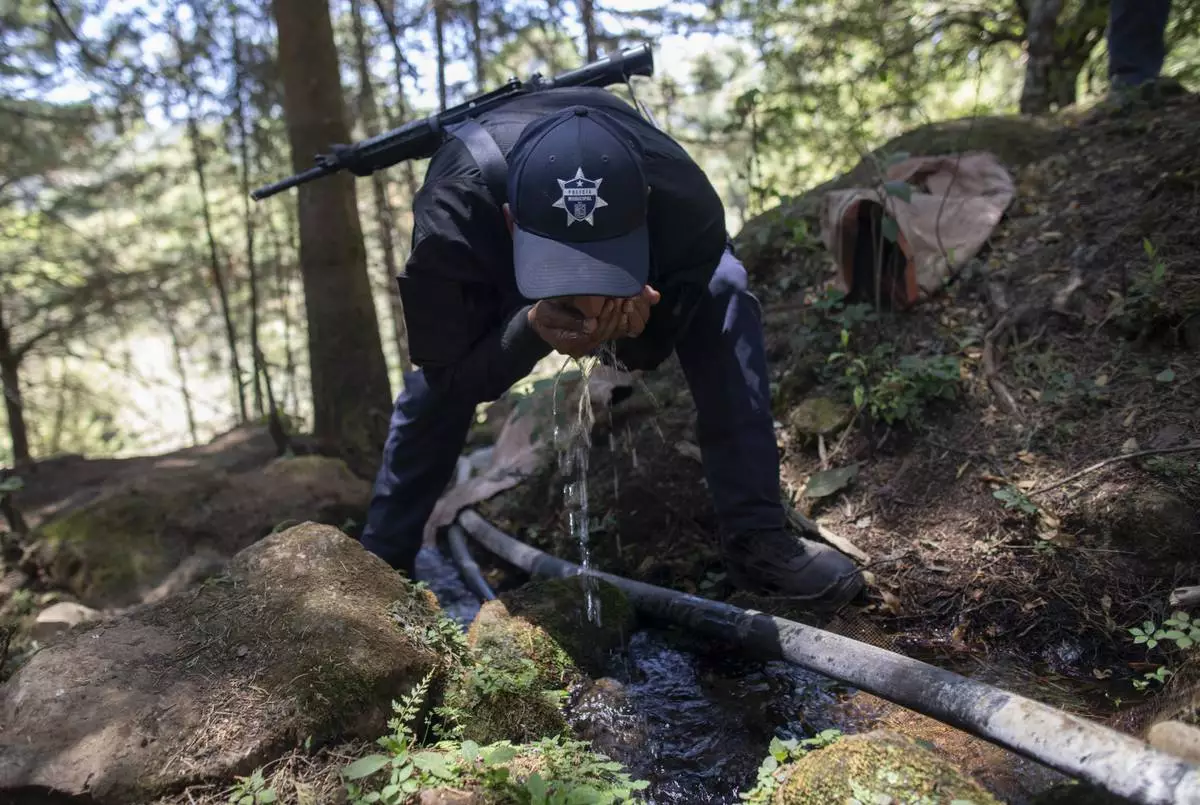
A municipal police officer drinks water from a stream lined with an unlicensed hose as he accompanies locals who are dismantling illegal water taps during a drought in the mountains of Villa Madero, Mexico, Wednesday, April 17, 2024. On Wednesday, dozens of residents, farmworkers and small-scale farmers from Villa Madero hiked up into the hills to tear out irrigation equipment using mountain springs to water avocado orchards carved out of the pine-covered hills. (AP Photo/Armando Solis)
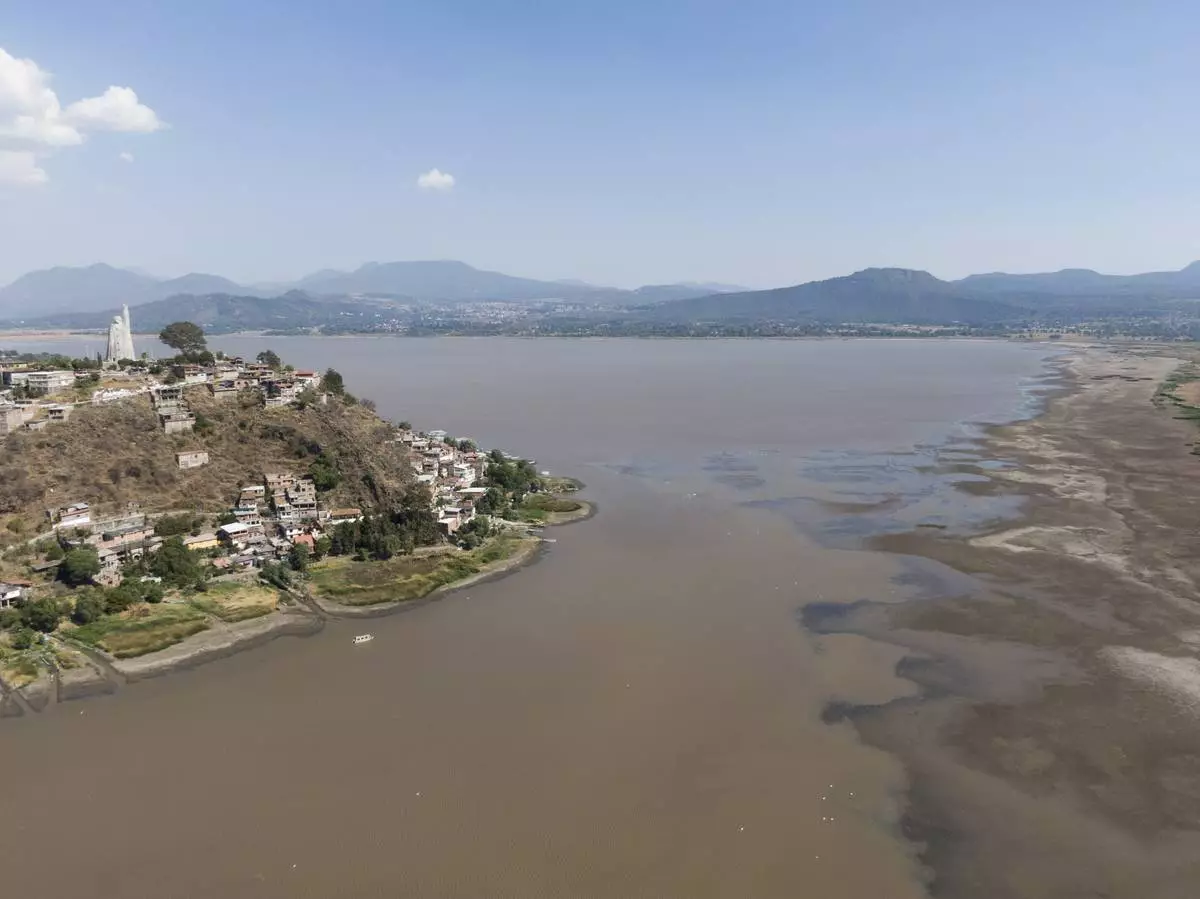
Janitzio Island stands in Lake Patzcuaro, which has low water levels during a drought in Mexico, Thursday, April 18, 2024. Farmers are starting to pasture livestock and plant crops on the lake bed. (AP Photo/Armando Solis)
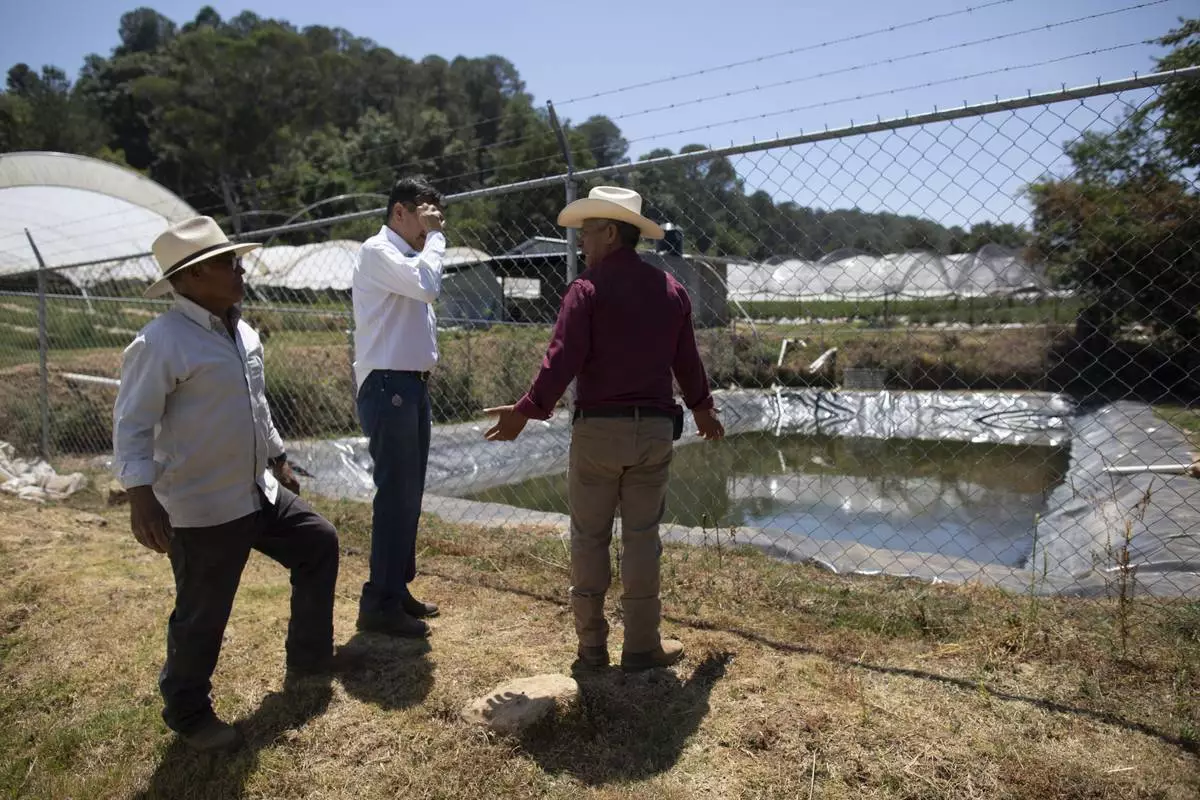
Residents of Villa Madero look at unlicensed irrigation holding ponds during a drought in the mountains of Villa Madero, Mexico, Wednesday, April 17, 2024. The group said they plan to meet with authorities to get the pond's owner to agree on a percentage of water usage, and if it fails, they plan to destroy it. (AP Photo/Armando Solis)
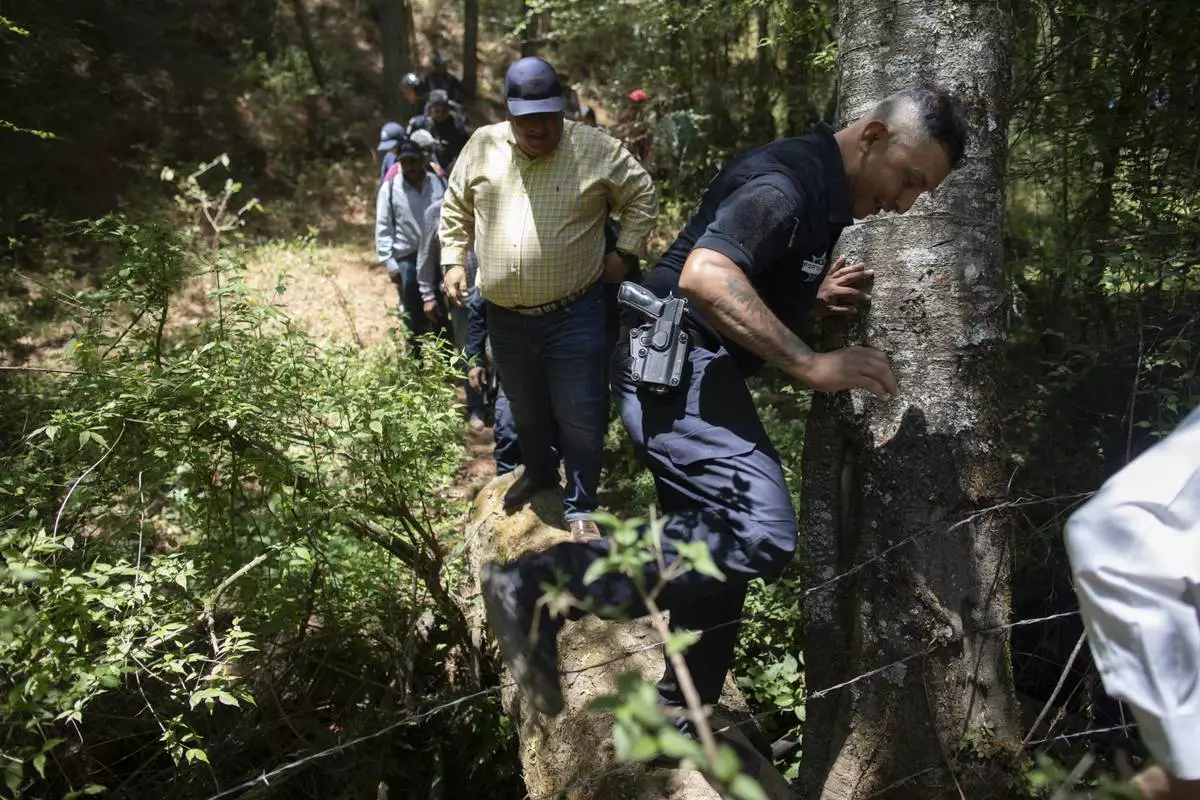
An armed police officer accompanies locals from Villa Madero through the mountains in search of unlicensed water intakes and irrigation ponds during a drought in Villa Madero, Mexico, Wednesday, April 17, 2024. Subsistence farmers and activists from the Michoacan town of Villa Madero organized teams to go into the mountains and rip out illegal water pumps and breach unlicensed irrigation holding ponds. (AP Photo/Armando Solis)
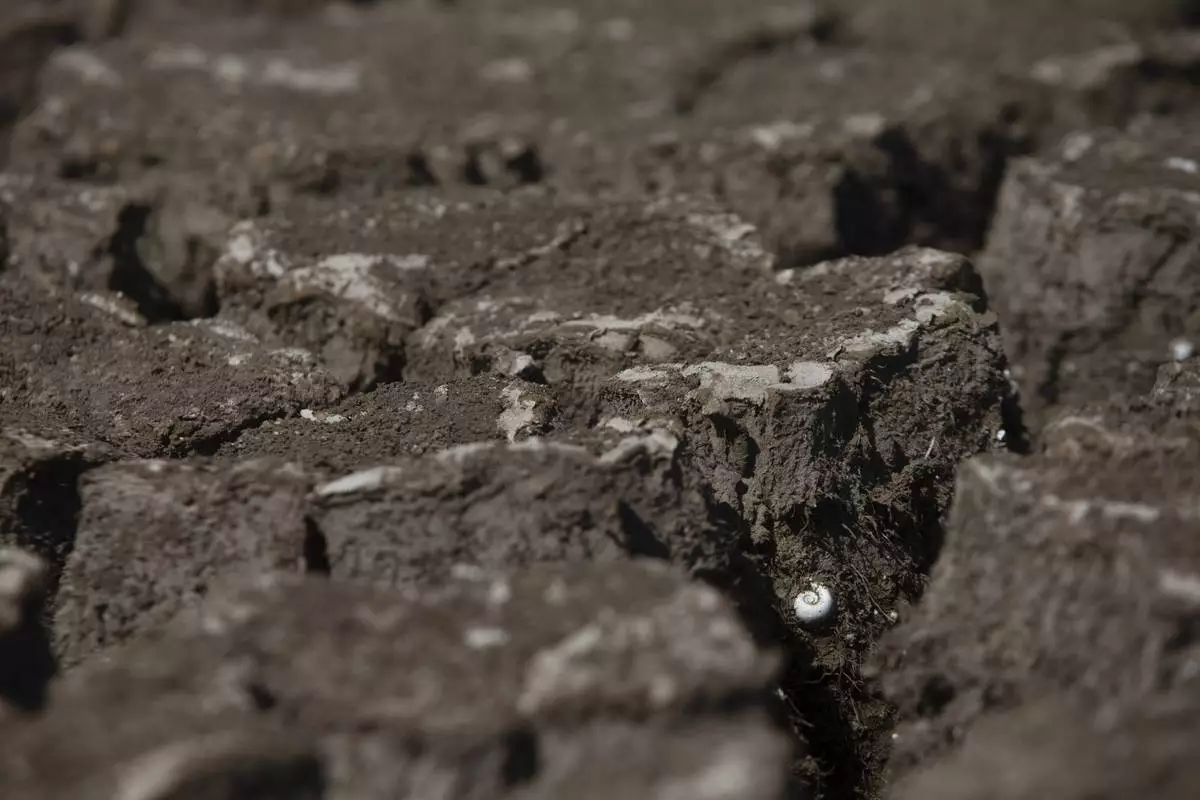
A snail lays in the dry bed of Lake Patzcuaro, during a drought in Mexico, Thursday, April 18, 2024. The lake has been reduced to about half its size, due to drought, deforestation, sediment buildup, and increased water demands from avocado and berry growers. (AP Photo/Armando Solis)

Boats are docked on the shore of Lake Patzcuaro, during a drought in Mexico, Thursday, April 18, 2024. Activist Juan Manuel Valenzuela estimates that 90% of the boats that used to fish and ferry tourists around are now out of service. (AP Photo/Armando Solis)
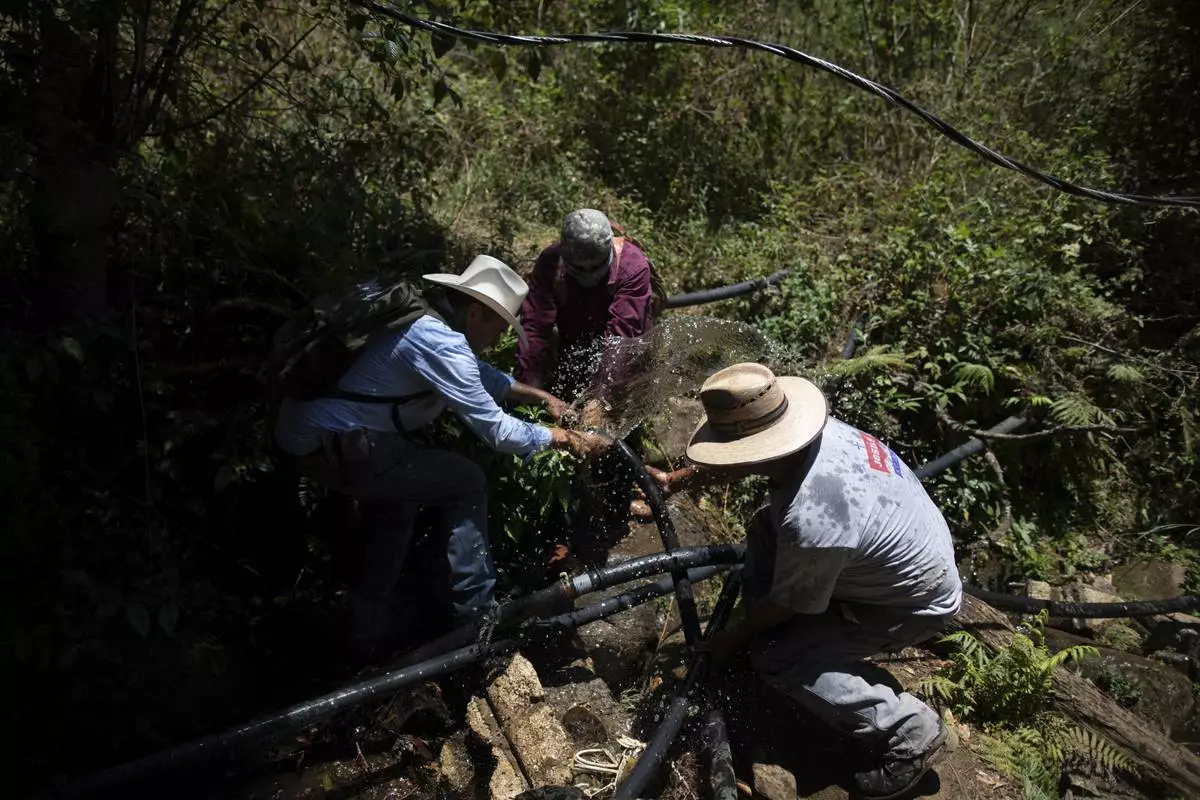
People dismantle an unlicensed water intake as their group of residents, farmworkers and small-scale farmers disconnect water taps in the mountains of Villa Madero, Mexico, Wednesday, April 17, 2024. As Mexico's drought drags on, angry farmers in Villa Madero have begun taking direct action to dismantle illegal water intakes which they say are drying up the streams in the mountains west of Mexico City. (AP Photo/Armando Solis)
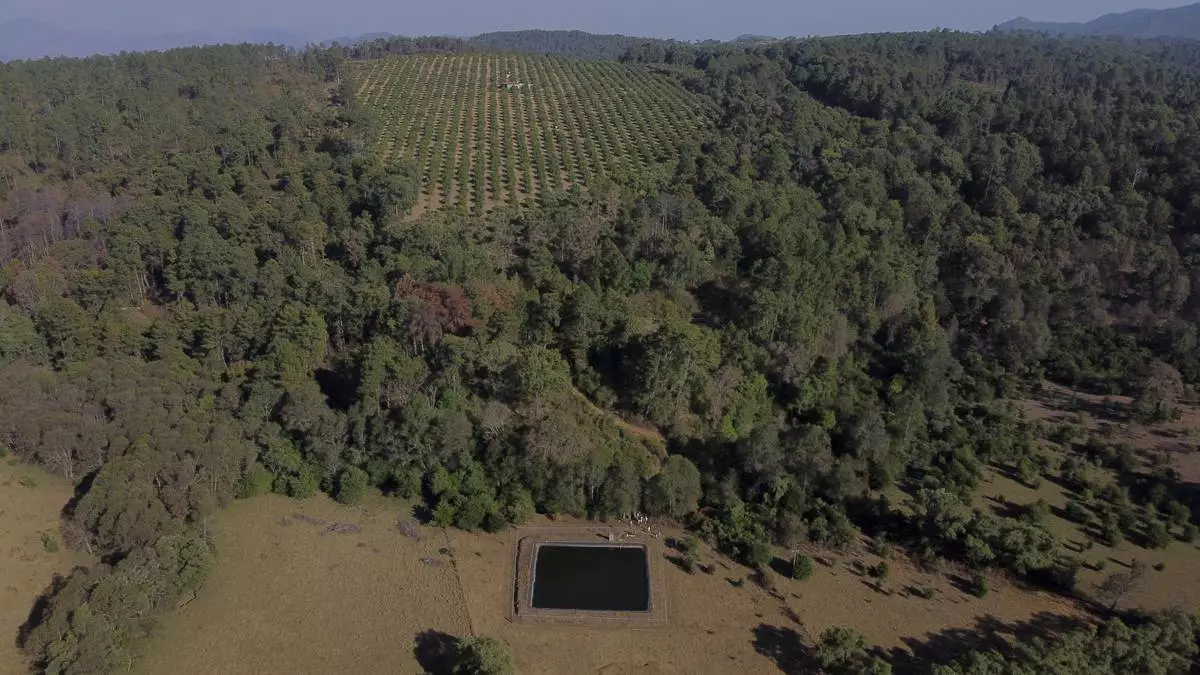
An unlicensed irrigation pond holds water near an avocado orchard in the mountains of Villa Madero during a drought in Mexico, Wednesday, April 17, 2024. Residents from Villa Madero who spotted the pond say they plan to meet with authorities to get the pond's owner to agree on a percentage of water usage, and if it fails, they plan to destroy it. (AP Photo/Armando Solis)
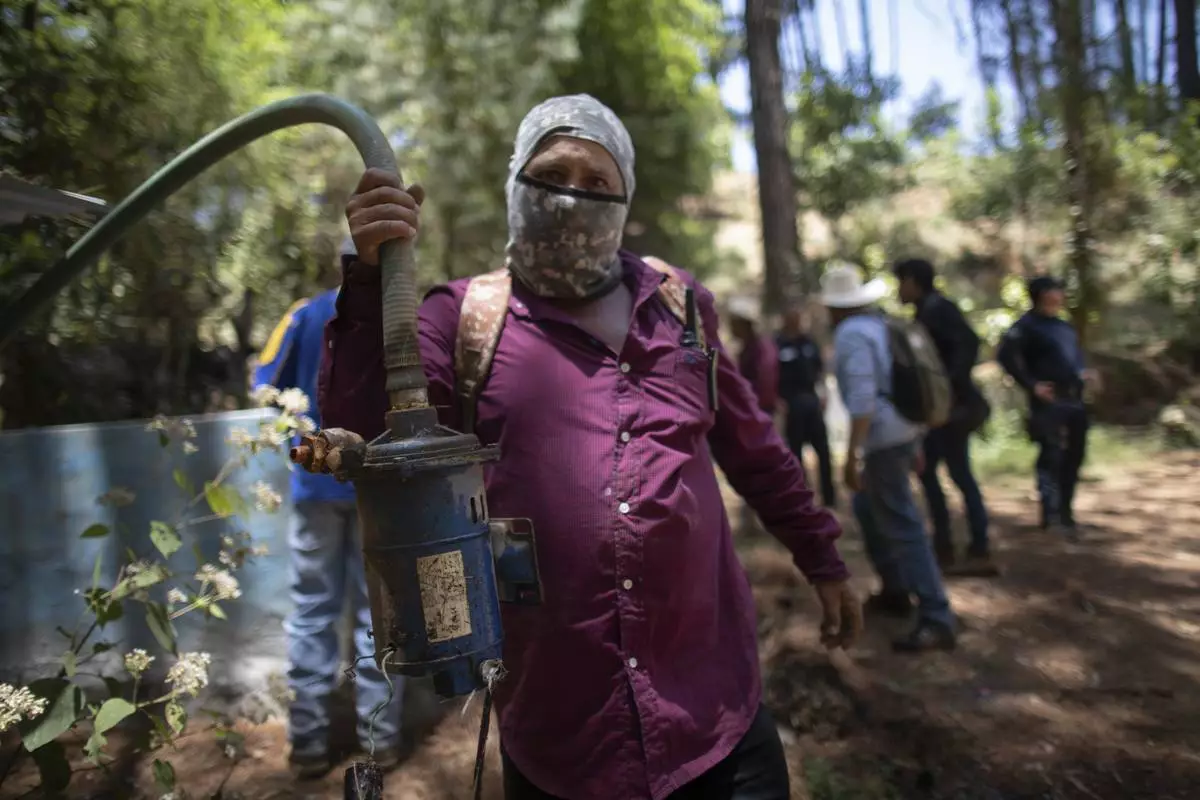
A man shows a pump removed from an unlicensed water intake as his group of residents, farmworkers and small-scale farmers from Villa Madero dismantle illegal water taps in the mountains of Villa Madero, Mexico, Wednesday, April 17, 2024. As a drought in Mexico drags on, angry subsistence farmers have begun taking direct action on thirsty avocado orchards and berry fields of commercial farms that are drying up streams in the mountains west of Mexico City. (AP Photo/Armando Solis)
















